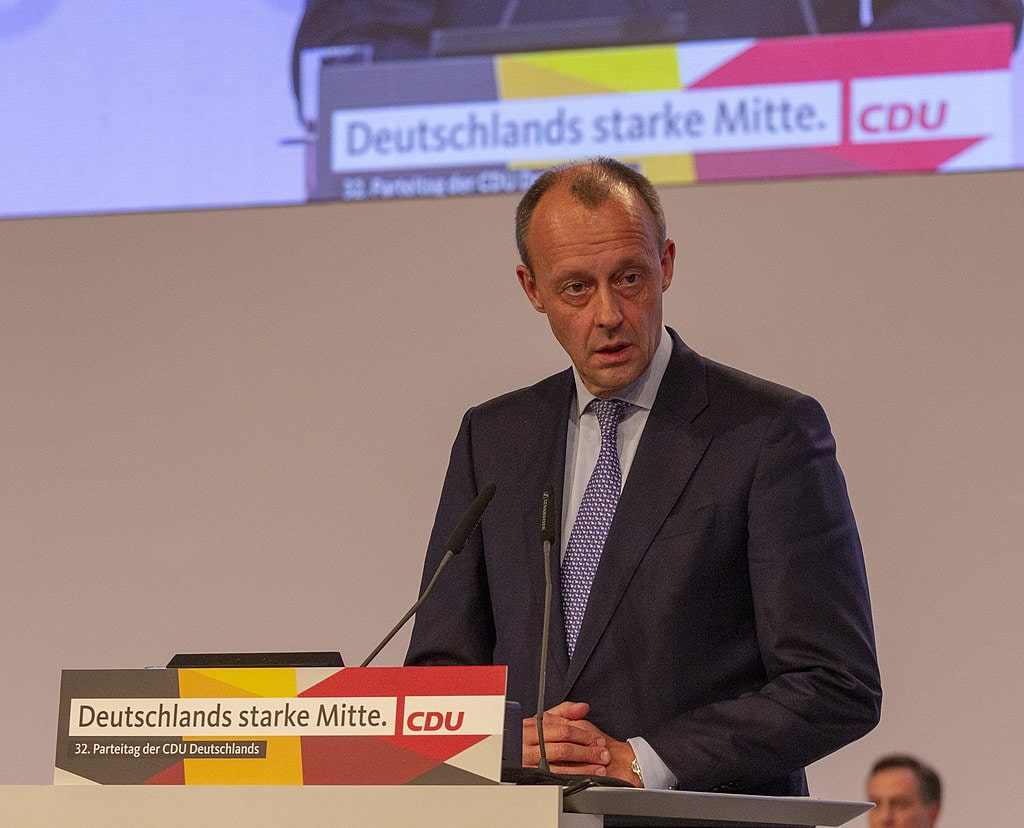
The center-right Christian Democratic Union (CDU) has found its new chairman in Friedrich Merz, Der Spiegel reports. During a virtual party conference on Saturday it held its final vote. With an overwhelming majority on his side (just shy of 95% of all votes), he now has a clear mandate to decide the course of his ailing party. Merz succeeds the more centrist Armin Laschet.
The CDU’s need for leadership is dire. Since its disastrous defeat in the 2021 federal elections (which recorded their worst ever result, going from 32.9% in 2017 to 24.1% of the votes), paired with ex-Chancellor Angela Merkel’s retirement, the CDU struggles to stave off irrelevance. A more polarized electorate now forces it to forego its ‘big tent’ approach, which in the past had served them well.
CDU’s roughly 400,000 members could vote online or by letter. By 17 December 2021, Merz had already won an absolute majority of 62.1% of the membership in an informal first round of voting, so a second round of voting was unnecessary. He beat Norbert Roettgen and Helge Braun, who had both shown themselves committed to Merkel’s centrist stance. With no real opposition left, the 66-year-old’s road to the chairmanship was cleared.
The socially conservative, economically liberal, and Roman Catholic Merz had vied for the position two times before. He envisions a clean break with the party’s centrism under Merkel, whose “lethargy” in 2019 he accused of covering Germany like a “carpet of fog.” A lawyer by trade, Merz was a senior legislator in the early 2000’s before deciding to pursue a corporate career, which took him as far as the chair of the supervisory board with asset manager behemoth BlackRock. He returned to politics for the 2018 CDU leadership election, which he lost.
“Deeply moved” by his election, the new chairman has little time to dwell on his decisive victory. Much is to be done. During his application speech, he was realistic about his party’s (now finding itself in the opposition) current predicament, a state of things which he called “sobering.” A new-found unity is of the essence, Merz knows, saying that “what we experienced in the Union in 2021, this may and will not repeat itself”—an unmistakable reference to the in-fighting the party’s senior leadership indulged in during the last election campaign. It is unclear exactly how he will pivot from the CDU’s former centrism and remain distinct from rightist-populist competitor AfD (Alternative for Germany) however. His views on climate protection, industrial jobs, social justice, the “radicalization” of a part of society, and the protection of social security systems could very well have come out of the mouths of any of his predecessors, the much-maligned Merkel included.
At any rate, in order for the CDU to make an impact, the incumbent ‘traffic light’ coalition, headed by Chancellor Scholz (SPD), must be attacked. The latter Merz accused of lacking a clear stance towards Russia’s military presence near the Ukrainian border, saying that “former chancellors would have shown leadership.” Merz has made it no secret that he wants his shot at the chancellery as well.
Finally, there’s the matter of (re)calibrating relations with its sister party, the regional Christian Social Union (CSU) in Bavaria. Its leader, Markus Söder, who in the two previous elections favored Annegret Kramp-Karrenbauer and Armin Laschet, has already shown a willingness for both parties to “open a new chapter and work well together.” In a short reply, a conciliatory Merz responded: “dear Markus, your hand is stretched out, I’ll take it.”
The party’s new leader expects to iron out all policy and ideology related questions at the next federal party conference at the end of September. “That is our firm will. We want to hold a face-to-face party conference again,” he concluded.
